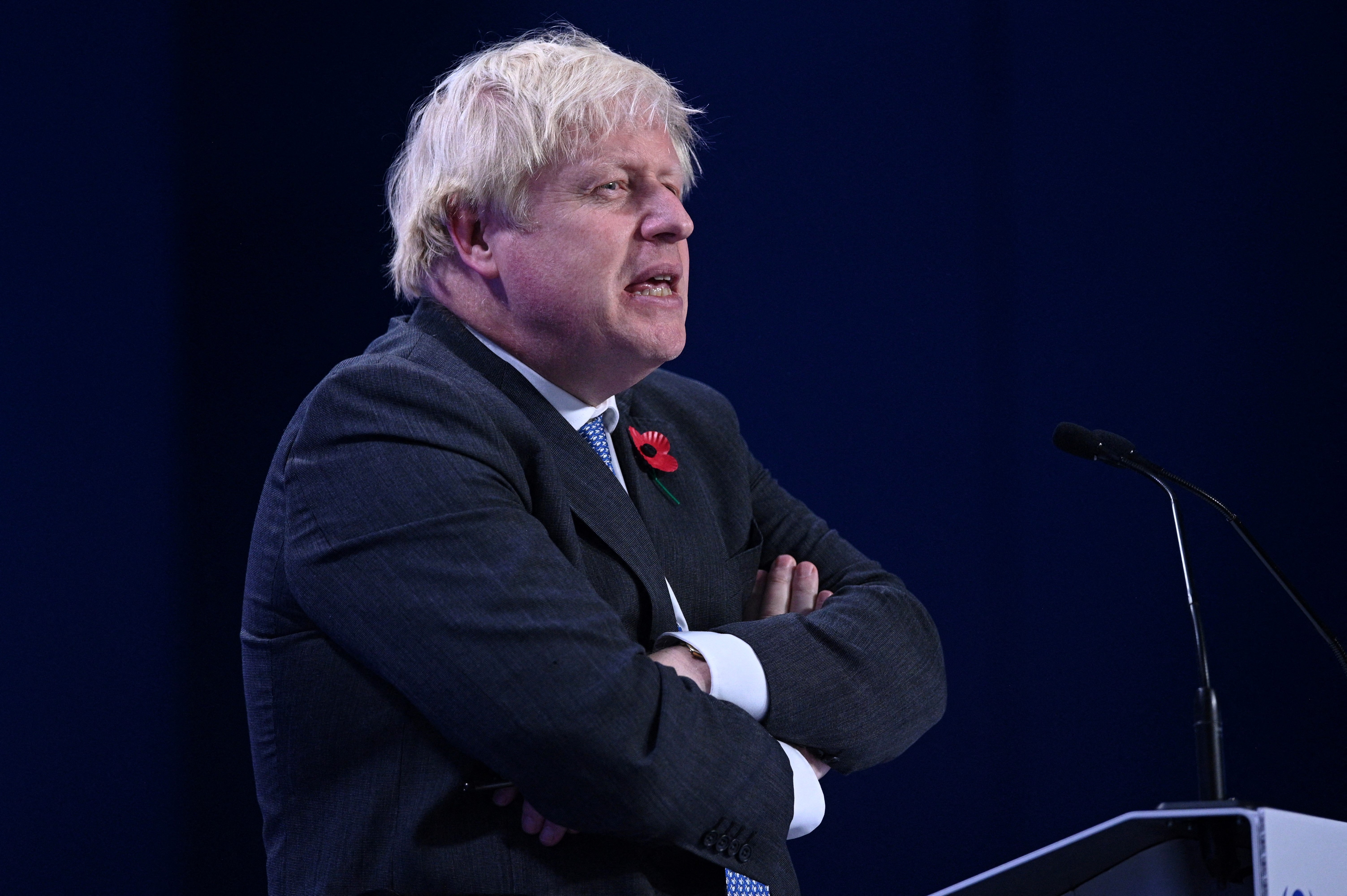Boris Johnson’s poll rating sinks to record low as nearly half of UK thinks prime minister is ‘corrupt’
Opinium survey finds ‘substantial narrowing’ in nation’s preferred choice for occupant of No 10

Boris Johnson’s approval ratings have hit a record low, according to a poll which found nearly half of UK voters believe the prime minister and his party to be “corrupt” in the wake of the paid lobbying scandal.
The Conservative Party has been engulfed in further allegations of sleaze this week after Mr Johnson not only ordered his MPs to vote against the standards watchdog’s recommendation that now former Tory MP Owen Paterson be suspended for 30 days, but also to establish a new committee to rewrite the process which found he had repeatedly broken lobbying rules.
In its first poll conducted after Mr Paterson’s resignation on Thursday, following an embarrassing U-turn from the government, Opinium found the Tories’ lead over Labour had narrowed to just one percentage point, dropping by three points to a rating of 37 per cent.
The prime minister’s own personal ratings were the lowest ever recorded by the pollster, slumping four per cent to -20, with half of respondents now disapproving of the job he is doing.
While Sir Keir Starmer’s approval ratings improved by a mere point, sitting at -9, the pollsters reported finding a “substantial narrowing” in public opinion over the past week on whether the Labour leader would make a better prime minister.
When questioned on Friday and Saturday, 28 per cent of respondents said Mr Johnson was the best choice for prime minister, down five points from the week prior. Conversely, Sir Keir saw his share increase by four per cent to 26. The largest proportion – 34 per cent – said neither was the best choice.
The findings appear to vindicate John Major’s assessment on Saturday that, as a lifelong Tory – and former Conservative prime minister – if he was “concerned at how the government is behaving”, it was likely that “lots of other people are as well”.
In an extraordinary attack, Sir John accused Mr Johnson’s government of behaving in a manner that is “un-Conservative” and “perhaps politically corrupt”.
Referring to the row over Owen Paterson’s suspension, he told the BBC: “I think the way the government handled that was shameful, wrong and unworthy of this or indeed any government. It also had the effect of trashing the reputation of parliament.”
Opinium found that just 22 per cent of voters now believe the Conservative Party to be “clean and honest”, while 48 per cent think it is “corrupt”.
These figures have gone six and seven percent respectively in the wrong direction since the pollster’s last survey in April, taken in the wake of revelations that former PM David Cameron had lobbied the chancellor Rishi Sunak on behalf of Greensill Capital.
The April survey also followed months of allegations over the government’s awarding of multimillion pound contracts to firms with whom ministers have personal links at the outset of the Covid crisis, while significant questions have since been raised about alleged cash-for-access schemes for Tory donors.
Mr Johnson – who has personally faced calls this week for a fresh probe into the funding for the refurbishment of his Downing Street residence, and for an inquiry into his failure to declare free holiday accommodation in Spain belonging to Zac Goldsmith, to whom he gave a peerage – fared only slightly better than his party, with 47 per cent of respondents believing him “corrupt” – a rise of five since April.
Just 22 per cent now believe the prime minister to be “clean and honest”, Opinium found, down from 30 per cent in April.
His own backbenchers were among those left seething this week with his decision to order them to vote for Andrea Leadsom’s amendment during the Commons ballot on Mr Paterson’s suspension, which proposed a Tory-led committee to rewrite conduct rules, only to U-turn the following lunchtime after a wave of headlines referencing “sleaze”, including on the Daily Mail’s front page.
Commons leader Jacob Rees-Mogg told MPs that he would instead seek cross-party talks on reform, conceding that the link between Mr Paterson’s case and need for wider reform “needs to be broken” – leaving Mr Paterson facing a fresh vote on his suspension until his resignation hours later on Thursday.
Ex-chief whip Mark Harper said it amounted to “one of the most unedifying episodes I have seen in my 16 years as a member of parliament”, while another ex-minister told The Independent that MPs were “apoplectic with rage” at being ordered to vote in a way which gave the impression they were bending the rules to save their colleague.
Mr Paterson, a former Cabinet minister who is accused of lobbying ministers and regulators on behalf of firms paying him more than £100,000 a year, said in a statement announcing his resignation: “I will remain a public servant but outside the cruel world of politics.”
“I maintain that I am totally innocent of what I have been accused of and I acted at all times in the interests of public health and safety. I, my family and those closest to me know the same. I am unable to clear my name under the current system,” he said.
Meanwhile, a fresh front in the sleaze scandal emerged on Saturday night, as a report byThe Sunday Times and Open Democracy claimed that the Tory Party appears to have been operating a secret scheme offering House of Lords peerages to wealthy benefactors as a “reward” for large donations.
A party spokesperson told the paper: “We do not believe that successful businesspeople and philanthropists who contribute to political causes and parties should be disqualified from sitting in the legislature.”
Join our commenting forum
Join thought-provoking conversations, follow other Independent readers and see their replies
Comments